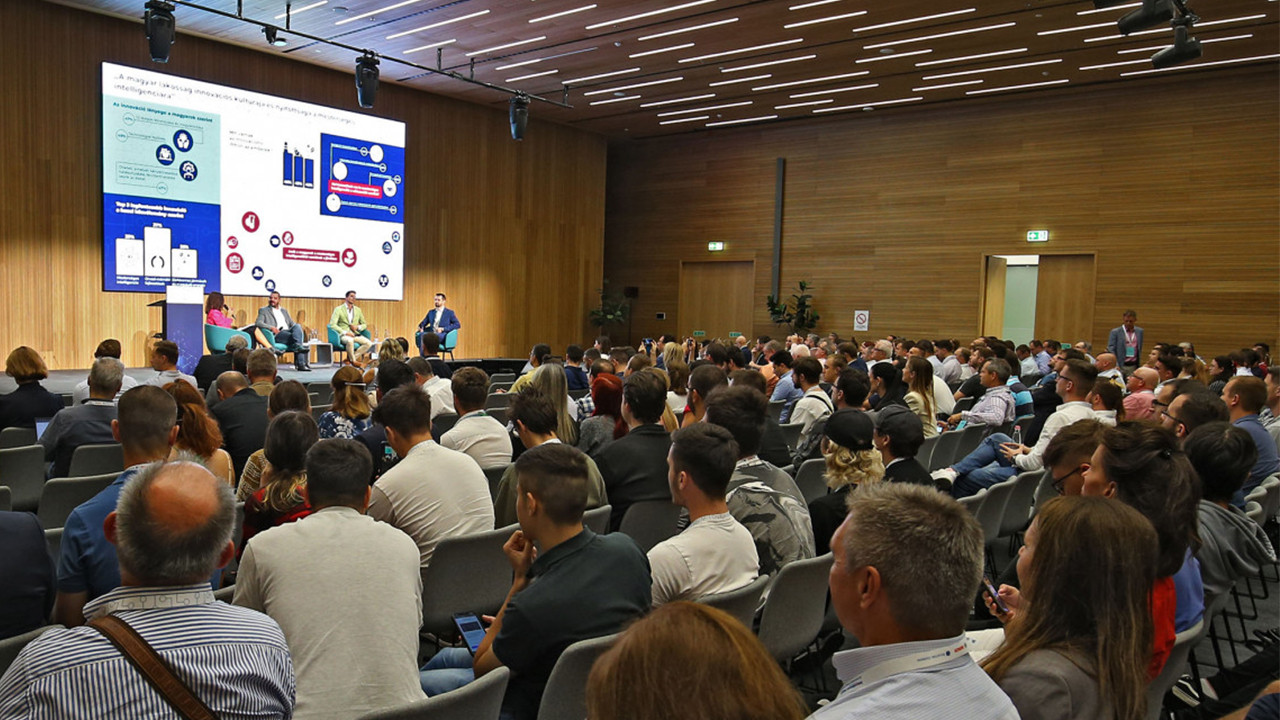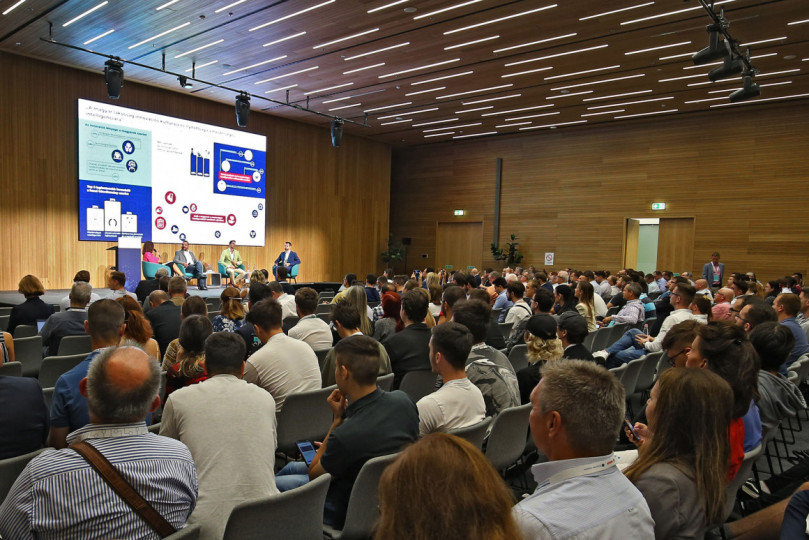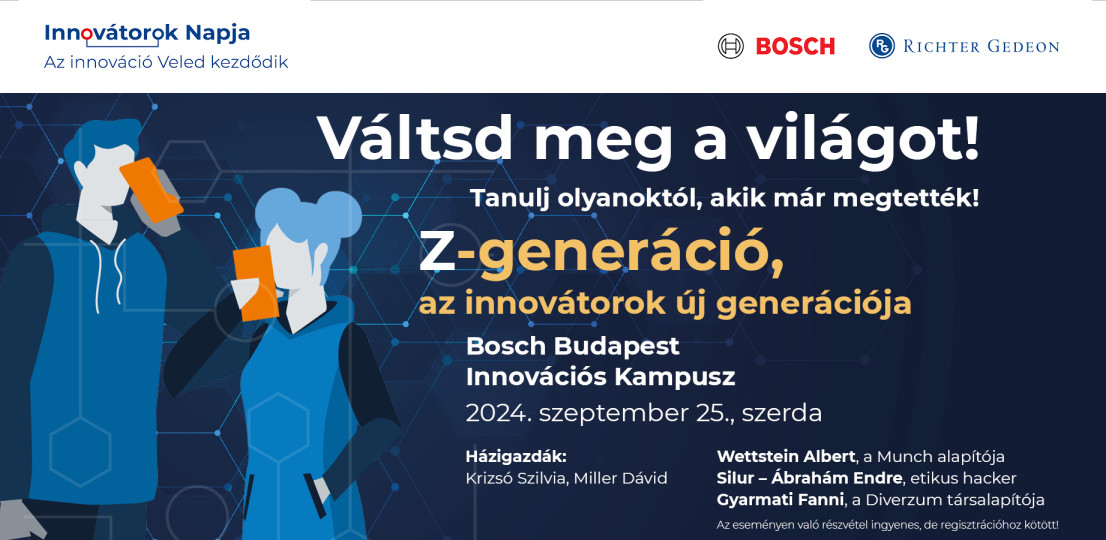“Gen Z” or the digital natives who are both brave and aware, honest and critical. How do people born between 1997 and 2012 feel about innovation, the workplace of the future and what do they think we need to do for a better future? With Generation Z role models, exciting research findings, inspiring roundtable discussions, future innovators and the latest pharmaceutical and automotive megatrends, this year's Bosch×Richter Innovators Day will focus on Generation Z.
Today's most pressing issues that will shape our future will be addressed on September 25 at the Bosch×Richter Innovators' Day at the Bosch Budapest Innovation Campus. The conference, which was meant to establish a new tradition, was first held last year by two of Hungary's leading companies to honor the iconic founders Robert Bosch and Gedeon Richter, both leading innovators of their time.
At this year's event, leading Hungarian and international experts from Bosch and Richter will seek answers to questions such as what forms of transportation and healthcare we will have in 5-10 years, what message the founders' life's work holds for Generation Z, and what new dimensions in innovation will be opened up by the unique collaboration between the ecosystem, higher education and major corporations.
Generation Z role models at the Bosch×Richter Innovators Day
The speakers and panelists at the Bosch×Richter Innovators Day will include successful startup entrepreneurs from Generation Z. Albert Wettstein, founder of Munch, Fanni Gyarmati, co-founder of Diverzum and Endre “Silur” Ábrahám, ethical hacker, will share their thoughts on the desire to innovate, motivation and the “innovator career”, among other topics. The latest results of a public opinion poll on young people's attitudes towards innovation will be presented by generations researcher Krisztián Steigervald.
The event will also showcase future Generation Z innovators, winners of this year's first Bosch×Richter Industrial Innovation Award. The competition launched by Bosch and Richter aims to encourage innovative thinking and the development of sustainable solutions for higher education students in the fields of mobility and healthcare.
The hosts of the Bosch×Richter Innovators' Day will be Szilvia Krizsó and Dávid Miller.
Futuristic walk through the Bosch and Richter visitor centers
Visitors will also be able to get a taste of the latest developments from Bosch and Richter at the on-site exhibition stands. The eTipo, a test vehicle jointly developed by Bosch and BME, will be on display. It is a real racing car, built on the most advanced electric drivetrain and shaped like a vintage Formula 1 car.
The Bosch×Richter Innovators' Day is free to attend but registration is required. Participants will also have the opportunity to explore the Bosch Rexroth CU.BE and the Richter visitor center.
More information, detailed program and registration: https://boschxrichter.hu
Zita Hella Varga
Phone: +36 70 667-6374
Bosch has been present in Hungary since 1898 with its products. After its re-establishment as a regional trading company in 1991, Bosch has grown into one of Hungary’s largest foreign industrial employers with currently eight subsidiaries. In fiscal 2023 it had total net sales of 2.207 billion forints and consolidated sales to third parties on the Hungarian market of 343 billion forints. The Bosch Group in Hungary employs more than 18,300 associates (as of December 31, 2023). In addition to its manufacturing, commercial and development business, Bosch has a network of sales and service operations that covers the entire country.
The Bosch Group is a leading global supplier of technology and services. It employs roughly 429,000 associates worldwide (as of December 31, 2023). The company generated sales of 91.6 billion euros in 2023. Its operations are divided into four business sectors: Mobility, Industrial Technology, Consumer Goods, and Energy and Building Technology. With its business activities, the company aims to use technology to help shape universal trends such as automation, electrification, digitalization, connectivity, and an orientation to sustainability. In this context, Bosch’s broad diversification across regions and industries strengthens its innovativeness and robustness. Bosch uses its proven expertise in sensor technology, software, and services to offer customers cross-domain solutions from a single source. It also applies its expertise in connectivity and artificial intelligence in order to develop and manufacture user-friendly, sustainable products. With technology that is “Invented for life,” Bosch wants to help improve quality of life and conserve natural resources. The Bosch Group comprises Robert Bosch GmbH and its roughly 470 subsidiary and regional companies in over 60 countries. Including sales and service partners, Bosch’s global manufacturing, engineering, and sales network covers nearly every country in the world. Bosch’s innovative strength is key to the company’s further development. At 136 locations across the globe, Bosch employs some 90,000 associates in research and development, of which nearly 48,000 are software engineers.
The company was set up in Stuttgart in 1886 by Robert Bosch (1861–1942) as “Workshop for Precision Mechanics and Electrical Engineering.” The special ownership structure of Robert Bosch GmbH guarantees the entrepreneurial freedom of the Bosch Group, making it possible for the company to plan over the long term and to undertake significant upfront investments in the safeguarding of its future. Ninety-four percent of the share capital of Robert Bosch GmbH is held by Robert Bosch Stiftung GmbH, a charitable foundation. The remaining shares are held by Robert Bosch GmbH and by a corporation owned by the Bosch family. The majority of voting rights are held by Robert Bosch Industrietreuhand KG. It is entrusted with the task of safeguarding the company’s long-term existence and in particular its financial independence – in line with the mission handed down in the will of the company’s founder, Robert Bosch.
Additional information is available online at www.bosch.hu, iot.boschblog.hu, www.bosch.com, www.iot.bosch.com, www.bosch-press.com, www.twitter.com/BoschPresse
About Gedeon Richter Plc.:
Headquartered in Hungary, Richter is an innovation-driven, specialized multinational pharmaceutical company. The activities of the Hungarian-directed Gedeon Richter Plc. are vertically integrated: they involve pharmaceutical manufacturing, research and development, and the corresponding sales and marketing. Its strategy is based on organic growth, complemented by targeted acquisitions, mainly in the field of gynecology. The company's mission is to preserve health and improve quality of life, including by bringing to market original and biosimilar products with high added value in areas where Richter has specific expertise in development and manufacturing. With a 123-year history, Richter has manufacturing subsidiaries in five countries in addition to its parent company and distributes its products through its own market network to almost 100 countries around the world. The Company employs nearly 12,000 people and had sales of more than 2.1 billion euros in 2023. The Richter Group relies on the commitment of its employees at home and abroad, its manufacturing and research experience of more than a century and works closely with its strategic partners to make its innovative products available worldwide.
Richter is the largest Hungarian pharmaceutical company. The company has sales activities on five continents and a direct presence in more than fifty countries. In total, the Richter Group consists of 64 member companies, of which 47 companies are active in the production and sale of pharmaceuticals, 8 companies are active in the wholesale and retail distribution of pharmaceuticals and 9 companies are active in other service activities. 93% of the Company's pharmaceutical sales are generated by its export activities: that amounted to 1,820.2 million euros in 2023. Our largest international markets are the USA, Russia, Poland, Germany and Spain.
Richter is one of the largest employers in Hungary, directly employing 5,600 people and a further 13,000 through its suppliers. Founded in 1901, Richter is the only pharmaceutical company in Hungary, which is also a dominant player on international markets, to operate without a foreign professional investor and under Hungarian management. Accordingly, the company's management makes decisions in the interests of the Hungarian national economy. Richter continues its research activities, makes investments and pays taxes in Hungary. The profits generated in foreign markets are also reinvested in Hungary, thus making a significant contribution to increasing the competitiveness of the country. In 2023, Richter's contribution to the national economy amounted to more than 188 billion forints in the form of taxes, investments and R&D expenditure.





